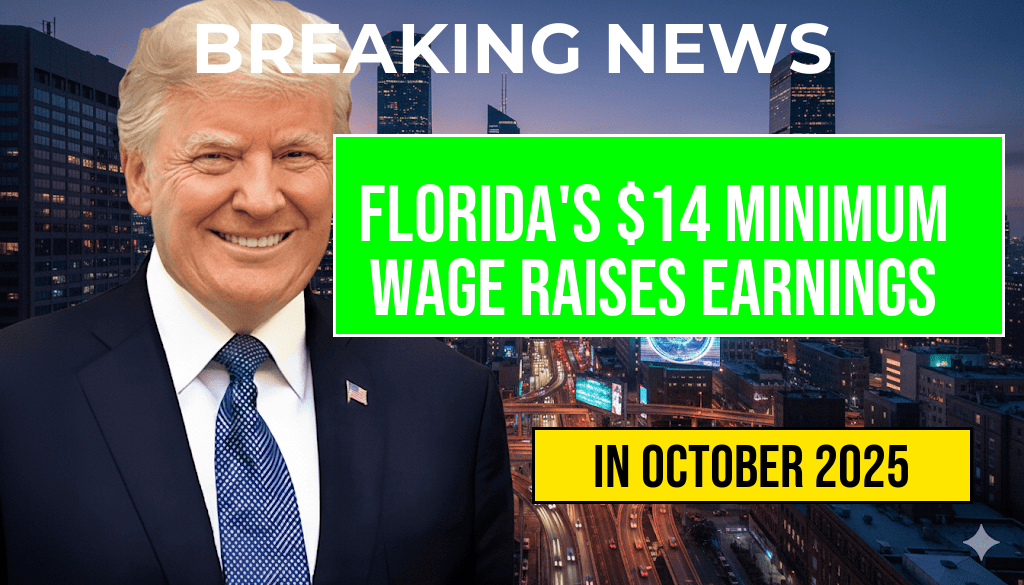Florida’s minimum wage increased to $14 per hour starting January 1, 2024, marking a significant boost for full-time workers across the state. This raise is part of a scheduled annual adjustment tied to inflation, reflecting Florida’s commitment to improving workers’ earning power amid rising living costs. According to state officials, the new wage will benefit approximately 2.5 million employees, with full-time workers seeing an estimated annual earnings increase of around $2,080. This increase aims to help address economic disparities and improve quality of life for low- and middle-income earners. Experts suggest that while the boost positively impacts workers’ income, it also prompts shifts in local business operations and labor markets, with some employers exploring automation or adjusting staffing levels.
Details of the Wage Increase and Its Economic Context
Scheduled Adjustment Based on Inflation
The state’s minimum wage law, enacted in 2020, mandates annual increases aligned with inflation rates measured by the Consumer Price Index (CPI). The 2024 adjustment reflects a 9.6% rise compared to the previous year’s rate, which was $12.50. Florida’s approach aims to keep pace with economic shifts and prevent wage stagnation, supporting low-income workers facing increased expenses for housing, transportation, and groceries.
Expected Impact on Full-Time Workers
| Current Hourly Wage | New Hourly Wage | Additional Annual Earnings |
|---|---|---|
| $12.50 | $14.00 | $2,080 |
Assuming a standard full-time schedule of 40 hours per week and 52 weeks annually, full-time workers earning the new minimum wage will see their gross income increase by approximately $2,080 per year. This calculation underscores the wage law’s potential to significantly improve economic stability for those earning near the minimum wage threshold.
Responses from Stakeholders
Workers and Labor Advocates
Many workers and labor groups have welcomed the increase, emphasizing its importance in combating inflationary pressures and improving workers’ purchasing power. “This raise brings us closer to a living wage and helps families manage rising costs,” said Laura Garcia, director of the Florida Workers’ Alliance. Advocates also highlight that increased wages can reduce reliance on public assistance programs, easing burdens on government resources.
Business Community Concerns
Conversely, some business owners express concern over the increased labor costs. Small businesses, in particular, cite challenges in maintaining profitability and competitiveness. “While we support fair wages, the sudden jump can strain cash flows, especially for seasonal or low-margin enterprises,” noted James Carter, owner of a Miami-based restaurant. Some employers are exploring automation and staff reductions as potential responses to rising labor expenses.
Broader Economic Implications
Labor Market Adjustments
The wage hike is expected to influence employment patterns, with some sectors experiencing hiring slowdowns or increased automation. According to economic analysts, industries such as hospitality, retail, and food service may face particular pressures to adjust staffing levels or implement efficiency measures.
Cost of Living and Inflation
Florida’s inflation rate, which influenced the wage increase, remains elevated, driven by factors including energy prices and supply chain disruptions. The wage adjustment aims to buffer workers from these pressures, but experts warn that broader inflation control measures are necessary to sustain wage gains.
Additional Context and Resources
Florida’s minimum wage legislation aligns with efforts in other states to ensure wages keep pace with economic changes. For more details on minimum wage laws and their implications, visit the Wikipedia page on minimum wage laws in the U.S.. Employers and employees seeking guidance on compliance and planning can consult resources provided by the Florida Department of Economic Opportunity.
Frequently Asked Questions
What is the new minimum wage in Florida?
The minimum wage in Florida has increased to $14 per hour, reflecting recent legislative changes aimed at supporting workers.
How does the wage increase impact full-time workers’ annual earnings?
With the new $14 per hour minimum wage, full-time workers can see an annual earnings boost of $2,080, assuming a standard 40-hour workweek and 52 weeks per year.
When did Florida implement the new minimum wage?
The new minimum wage was officially implemented in 2023, marking a significant increase from previous rates to support the state’s workforce.
Who benefits most from the wage increase?
Full-time workers earning close to the minimum wage benefit the most, as the increase directly raises their annual income and improves their financial stability.
Are there any exceptions or special cases for the new wage law?
Yes, certain exceptions may apply, such as temporary workers, tipped employees, or specific industries. It’s advisable to consult local labor laws for detailed information.








